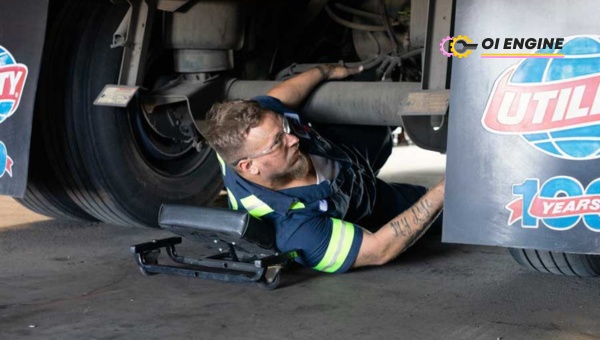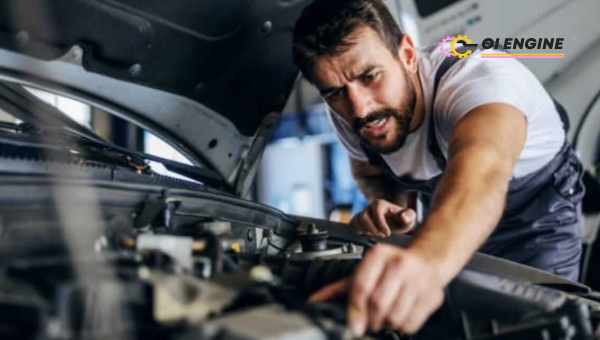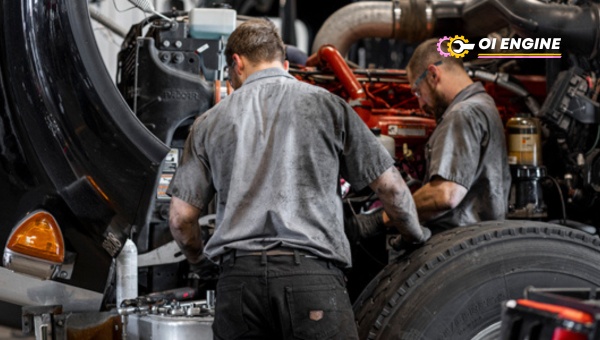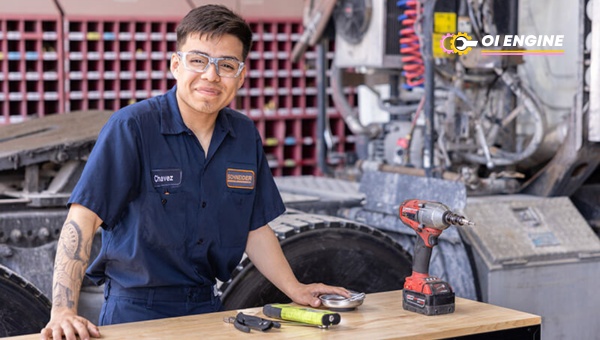Have you ever wondered if the folks fixing big trucks need special licenses just to tinker under the hood? The very notion might sound a bit odd – after all, most people think of drivers when talking about commercial licenses.
But here’s something that might grab your interest: there could be more to it, especially when we’re looking at larger vehicles and what it takes to keep them running.
Dive into the world of mechanics and find out if they do mechanics need CDL? – you might be surprised by what you learn!
In the world of turning wrenches and diagnosing engine troubles, most mechanics do not typically require a Commercial Driver’s License (CDL).
There are special times when having one could be necessary. For instance, if a mechanic needs to test drive heavy trucks or buses on public roads as part of their job duties, then yes – they’ll need that special piece of plastic in their wallet.
The Requirement of a CDL for Mechanics: Do Mechanics Need CDL?
In the automotive industry, there are various licenses required for different trades. One such license is the Commercial Driver’s License (CDL).

As a mechanic, you may wonder about its relevance to your work. Does fixing engines and maintaining vehicles necessitate such formal certification? This guide will delve into the specifics of what a CDL represents and whether mechanics need to procure one.
What Is a CDL?
A Commercial Driver’s License (CDL) is fundamentally different from the everyday driving license that most people hold.
A CDL certifies you to operate large, commercial motor vehicles that common drivers are not permitted or trained to drive. This ranges from heavy-duty trucks to buses carrying dozens of passengers.
Moreover, beyond just driving these sizable machines, possessing a CDL also indicates that you understand how they function – their intricacies and limitations.
The foundational knowledge imbibed through securing this license aids in detecting malfunctions and servicing these automobiles more effectively.
The automotive industry highly regards professional qualifications like these; often making them prerequisites for certain job roles.
They set apart those who have undergone rigorous training in handling heavy-duty machinery as opposed to those who haven’t.
As such, it is an indispensable asset in fields that involve managing or operating large commercial vehicles – be it driving them or ensuring their smooth running by way of repairs and maintenance.
Do Mechanics Need CDL?
To address the query directly: Do mechanics need CDL? The simple answer is – It depends!
There’s no universal law dictating that every mechanic must possess this license. But several instances might prompt you as a mechanic towards acquiring one.
If your work involves test-driving heavy trucks post-repair or needing to move these oversized vehicles within your workspace occasionally, obtaining a Commercial Driver’s License can certainly come in handy.
Conversely, if your scope of work is limited to servicing small vehicles, cars, or mini-vans that do not surpass weight restrictions as stipulated by the Department of Transportation, then a common driver’s license could suffice.
The potential benefit of having a CDL extends beyond interspersion with your daily mechanic duties.
It can unequivocally showcase your dual ability– understanding complex machinery while also being adept at maneuvering such heavy vehicles.
This gives you an edge in professional settings; signaling a unique level of expertise and commitment to higher standards in your career as a well-rounded mechanic in the automotive industry.
Assessment of CDL Requirements and Exemptions
When we discuss the requirement for a Commercial Driver’s License (CDL), it’s crucial to keep in mind that this licensing is not a one-size-fits-all necessity.
Different professions have different needs, and the demands put forth by the Department of Transportation (DOT) take these into account. Therefore, it becomes essential to identify who exactly is mandated to carry a CDL and who isn’t under these rules.
Who is required to obtain a CDL?
The primary purpose of a CDL is to ensure that an individual has the capabilities needed standard for operating commercial vehicles.
Such vehicles are typically larger and more complex demanding specialized skills beyond those required for handling everyday passenger cars.
So, who needs such extensive know-how? The simple answer is – anyone engaging in driving such commercial vehicles is part of their professional responsibilities.
This could range from truck drivers who transport goods across state lines to bus drivers carrying numerous passengers daily.
They all are expected by law to hold an appropriate CDL based on the kind of vehicle they drive as these hold increased potential risks on our roads.
In some cases, certain mechanics may also require having a CDL handy when they need to test-drive big rigs or other bulky machinery that fall under the advocate’s mandate for commercial vehicles.
As mechanics often run diagnostics or try repair strategies that involve taking a vehicle out on public roads, they need assurance that they can handle such huge machines safely as any professional would expect.
Even though mechanics aren’t usually held accountable for heavy-duty hauling jobs themselves, their line of work may often put them in situations where capability with commercial-type vehicles becomes an essential part hence mandating possession Of A CDL.
Who is not required to obtain a license under CDL requirements?
In contrast – just like every profession doesn’t demand proficiency in operating commercial-type large automobiles, not everybody must hold onto this specific certification unless expressly required by the job itself.
Nullifying a common misconception, just because you can fix or maintain a vehicle doesn’t mean you are also legally entitled to operate it on public roads —unless this task is specified under your profession and necessitates an accountable license.
Farmers who operate machinery only within their fields, Firefighters riding emergency vehicles, or mechanics working solely on regular non-commercial vehicles, are exempted from having to own a CDL.
Simply put – If you’re not involved in operating large commercial vehicles for job purposes that interact directly with public traffic – such as hauling goods cross-country in seventeen-wheeled semi-trucks or transporting 40 passengers around town daily in coach buses; there’s no strict conformity demand for owning a CDL.
Breaking Down The Need For A CDL
Unveiling why a Commercial Driver’s License (CDL) is necessary requires considering the primary tasks this license empowers you to carry out.
CDL certification enables individuals to handle large vehicles that ordinary licensing doesn’t cover due to their unique handling requirements and potential risk factors. Let’s get into details and discuss the need for having a CDL license!
What is the need for having a CDL license?
The essential requirement of possessing a CDL boils down to one thing – the type of vehicle you operate. Big commercial vehicles such as trucks, buses, and other heavy machinery are not like driving your regular everyday car; their design, weight, and mechanics are far more intricate than a normal vehicle. It becomes crucial that only trained professionals should be licensed to drive them.
This might make people wonder: “Do mechanics need a CDL?” While the question seems straightforward, there isn’t necessarily one precise answer. Whether or not mechanics need this special permit largely depends on their working circumstances.
- Safety: Getting your hands on these mammoth machines effortlessly means tackling substantial power at your disposal which if mishandled can lead to catastrophic incidents risking both the driver’s and others’ lives present at the spot.
- Legal Requirements: Certain state laws necessitate anyone operating large vehicles to have proper certification – essentially mandating obtaining a commercial driving license.
- Career Enhancement: Earning certain certifications including but not limited to having CDL contributes to raising the employability quotient as it reflects commitment towards building technical skills required in specific industries.
Whereas primarily aimed at professional drivers responsible for hauling goods cross-country or carrying numerous passengers safely from location A to B; mechanics too in some cases may require possessing some sort of specialized licensing depending upon workplace conditions.
CDL for Mechanics and Diesel Technicians Explained
In the world of automobile maintenance and repair, having the right knowledge is crucial. In some cases, mechanics and diesel technicians may be asked to have a CDL or Commercial Driver’s License. Let’s explore this further.

Why Would a Mechanic Need a CDL?
The answer is straight – not all mechanics necessarily require a CDL but in some situations, it does give them an edge. The key to learning this lies in the kind of work they do.
- Driving Large Vehicles: A mechanic might need to drive large vehicles as part of their job duties. Driving commercially rated vehicles often requires a commercial driver’s license due to safety regulations.
- Transporting Heavy Equipment: Another task that may necessitate holding a CDL is transporting heavy equipment or materials used in repairing automobiles. The weight and size of these loads can create special road safety concerns that are addressed with the specialized training received through obtaining your Commercial Driver’s License.
- Improved Employment Options: Although it may not be essential for every mechanic position, having this credential can improve employment options by opening doors to positions where employers prefer or require you to hold one because of their business needs.
All these instances make having a CDL license beneficial for mechanics.
Why would diesel technicians need one?
Now let’s talk about what you might want to know: Do diesel technicians require a Commercial Driver’s License? Again it’s not always mandatory, but indeed becomes necessary under certain circumstances:
- Diagnose and Repair: Diesel technicians usually work with larger vehicles like trucks and buses running on diesel fuel, which are classified as commercial vehicles by law most times. As part of diagnosing and repairing these kinds of heavy-duty vehicles, simple driving around might be required hence needing more than just your standard driving license.
- Road Testing: After conducting repairs on such heavy vehicles, diesel technicians might need to carry out road testing. This practice ensures the vehicles are safe for travel and running smoothly post-repairs.
- Employment Opportunities: Like mechanics, even diesel technicians can boost their employment prospects by obtaining a CDL.
To be clear-cut, it isn’t across the board required for diesel techs to carry a CDL but yes, certain job functions can require this extra license.
What Are The Varied Types Of Licenses?
Within the realm of Commercial Driver’s Licenses (CDLs), there exist various types, each allowing you to operate different classifications of vehicles.

The three primary classes for anyone seeking to drive commercial vehicles are Class A, Class B, and Class C licenses. Each one comes with its unique permissions, and requirements may also differ.
Distinguishing Three Types Of Licenses
Class A licenses permit you to operate any combination of vehicles with a Gross Vehicle Weight Rating (GVWR) greater than 26,001 pounds if the vehicle being towed weighs more than 10,000 pounds.
This typically involves larger vehicles such as tractor-trailers or flatbeds. This license is deemed necessary for those looking to handle heavy machinery or transport voluminous goods regularly. Some over-arching pointers related to this license class include:
- The requirement of passing specific tests about larger machinery.
- Potentially requiring further endorsements depending on the cargo type.
Class B license. Individuals holding a Class B CDL can drive any single vehicle with a GVWR greater than 26,001 pounds along with a towed vehicle not exceeding 10,000 pounds. This might encompass large passenger buses or delivery trucks for instance:
- Generally recommended for drivers handling slightly smaller commercial vehicles.
- May call for additional endorsements such as passenger carry based on your role.
Class C licenses are required for drivers who intend to operate any class of vehicle carrying hazardous materials or meant for transporting larger groups of people (16 or more passengers). It covers all other forms that didn’t fit within the ambit of the Class A or B setup:
- Suitable where neither Class A nor B categories seem like an appropriate fit.
- Again based on the nature of the material transported could necessitate extra endorsements.
It’s important to know, that each CDL license marks a step up in the weight and size of vehicles you’re capable of handling.
The higher the class you ascend to, the wider range of opportunities open up for you in the commercial driving landscape.
Pros And Cons Of Holding A CDL As A Mechanic Or Technician
Being a mechanic or technician requires skill, precision, and a good deal of knowledge. But is it necessary to go that extra mile and get CDL certified?
As we delve into the benefits and drawbacks of having a Commercial Driver’s License (CDL) as a mechanic or technician, let’s examine how it impacts their profession.
Benefits Derived by Diesel Technicians and Mechanics With License
Having a CDL as part of your professional arsenal can bring about certain perks. First off, as mechanics with this license, you’re more likely to be chosen for top-tier jobs involving heavy commercial vehicles.
These are typically high-paying jobs that prioritize mechanics with solid credentials like the CDL.
- Greater job opportunities: Having a CDL expands your potential job pool. Employers often prefer hiring someone who has multiple qualifications for peace of mind.
- Higher salary: As mentioned before, jobs dealing with commercial vehicles usually pay well. Having proper licensure can put you in line for these lucrative positions.
- Gaining valuable experience: Driving the very machines you are repairing provides invaluable hands-on experience that could prove beneficial in troubleshooting problems.
Now that we get the bright side of being licensed, let’s turn over the coin and look at some potential drawbacks technicians might face while obtaining or holding onto this certification.
Disadvantages Faced While Acquiring Or Maintaining The Certification
Despite all its perks, getting hold of a CDL isn’t an easy journey; neither is maintaining one.
- Time-consuming process: Getting certified takes time— time which could be utilized by learning other skill sets instead.
- Expensive training courses: To qualify for the test itself may require vocational courses which come at an added cost.
- Regular renewal and updates: You have to mandatorily renew your license periodically which might prove inconvenient amidst busy work lives.
- Fines and penalties: Any non-compliance, such as letting your license lapse or not following traffic rules, can lead to hefty penalties which would undo all the hard work you’ve put into acquiring it in the first place.
The choice of whether or not to obtain a CDL is yours. It’s best to weigh the pros and cons thoroughly before making a decision. After all, climbing up the career ladder involves prudent decisions every step of the way.
What It Means For A Mechanic or Technician To Be CDL Certified?
Being CDL-certified as a mechanic or diesel technician brings along specific considerations, possibilities, and expectations.

When your mechanic’s toolbox expands to include this additional certification, you might find new areas open up in the automotive world for you.
Your skill set now involves the ability to do more than just repair and maintain vehicles. But let’s consider each case separately for clarity: as a diesel technician, then from a general mechanic’s perspective.
When Would a Diesel Tech Need a CDL?
Talking about Diesel Technicians specifically, it is not uncommon for them to need a commercial driver’s license (CDL).
One essential situation arises when they need to test-drive heavy-duty trucks after repairing or servicing them. Here are some scenarios that may mandate having a CDL:
- Testing commercial vehicles: When service on large trucks is completed, techs often have to take them out for test drives – ensuring that they operate correctly post-service.
- Dealing with customer requests: Particular customers may prefer their work done by technicians holding this certification – providing an added layer of assurance.
- Conforming to regulations: Essential safety rules call for anyone driving heavy-duty commercial vehicles—you’re classified by these laws irrespective of whether you only repaired the vehicle.
Simply put, it provides greater versatility as a professional in your field by having the right credentials.
CDL Licenses for Mechanics – Delving Deeper
While the usual perception is that mechanics don’t typically require Commercial Driver’s Licenses (CDL), certain circumstances might demand it. Let’s delve deeper into situations where it proves useful and even necessary:
- When Large Vehicles are Involved: If the job requires driving or moving substantial vehicles around–for example within large maintenance bays–legally speaking, one would need this unique license.
- Mechanics involved in Towing: If your work routinely involves towing vehicles, especially heavy-duty ones, holding a CDL becomes essential.
- Working on Government contracts: Some government contracts require all mechanics involved to hold a CDL. That’s because servicing or moving large municipal or federal vehicles often forms part of the job.
The CDL is not just a certification needed for driving but an additional qualification signifying your ability to work on and maneuver bigger vehicles.
Having this in possession can dramatically widen the playing field you operate within as a mechanic.
While I agree it might not be necessary for every mechanic out there, it showcases one thing very clearly – when you’re equipped with more tools (or certifications), the jobs you can handle substantially increase along with your market value as an expert in your field. It’s that simple.
FAQs
Is a CDL necessary for auto mechanics?
No, auto mechanics typically do not need a CDL. If they operate large vehicles as part of their job, a CDL might be required.
What is the purpose of obtaining a CDL?
CDL is essential for drivers of large, heavy vehicles, like trucks and buses. It ensures the driver has the skills and knowledge to operate these vehicles safely.
Can having a CDL benefit auto mechanics?
Yes, having a CDL can open up additional employment opportunities for mechanics who might need to test drive or transport larger vehicles.
Is it difficult to obtain a CDL?
Obtaining a CDL involves passing both written and skills tests. The difficulty will depend on the individual’s aptitude and preparation.
Where can I study for the CDL tests?
Each state provides official manuals for studying. Online resources such as TruckersReport offer practice tests.
Conclusion
In the realm of automotive, holding a CDL (Commercial Driver’s License) assumes a certain importance.
It’s not a universal requirement for all professionals in the field. As we’ve discussed, whether or not mechanics need a CDL largely depends on their specific duties and responsibilities.
Having this license can open up opportunities and add to one’s professional credentials, but obtaining it comes with its unique challenges too.
Therefore, to answer the question “Do mechanics need CDL?”, it relies heavily on individual situations. It is crucial then that as you navigate your journey as an automotive professional, you stay informed about the requirements of your work environment and make choices that propel your career forward.
